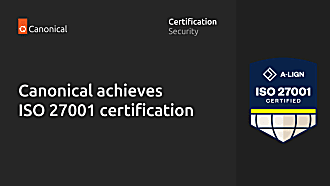Jon Melamut
on 20 September 2012
Development on Ubuntu 12.10 is wrapping up, with another beta release due on September 27th. Blog posts and reviews of the user-facing features are already hitting the Internet, there has also been a lot of important work done lower in the stack as well. While that lower-level work doesn’t usually make the headlines, support for Secure Boot has (rightfully) been in the spotlight and therefore I felt it was important to give an update on how Ubuntu 12.10 will support Secure Boot. There has been a lot of collaborative discussion around technical and legal implications, between Canonical, OEMs, upstreams, and BIOS manufacturers, and I’m happy with the end result. I’m confident that end users, OEMs, and the free and open source community is getting the best, most secure, and safest solution with Ubuntu’s implementation of Secure Boot.
When we announced our plans to support Secure Boot in Ubuntu 12.10, we originally planned that we would use an EFILinux bootloader. We chose that option over the Grub 2 bootloader because Grub 2 has licensing provisions that, in our view at the time, could have forced disclosure of Canonical keys if an OEM partner had inadvertently shipped a computer which did not allow disabling of Secure Boot.
In subsequent discussion with the Free Software Foundation (FSF), who owns the copyright for Grub 2, the FSF has stated clearly that Grub 2 with Secure Boot does not pose a risk of key disclosure in such circumstances. We have also confirmed that view with our OEM partners, and have introduced variations to the Ubuntu Certification program and QA scripts for pre-installs to ensure that security and user choice are maintained on Ubuntu machines. Therefore, we have decided that Grub 2 is the best choice for a bootloader, and will use only Grub 2 in Ubuntu 12.10 and 12.04.2 by default.
I’d like to thank the many people at Canonical, our OEM partners, the open source community, the UEFI working group and the FSF who have been instrumental in resolving this issue. In particular, John Sullivan, Executive Director of the FSF, has been a source of clarity and commitment in navigating these unchartered waters. John says “We are pleased with Canonical’s decision to stick with Grub 2. We know that the challenges raised when trying to support true user security without harming user freedom — Secure Boot vs. Restricted Boot — are new for everyone distributing free software. This is the situation for which GPLv3 was written, and after helpful conversations with Canonical, we are confident the license does its job well, ensuring users can modify their systems without putting distributors in untenable positions.”
We’re in the homestretch to the Quetzal taking flight; you can always download the latest beta at http://releases.ubuntu.com/12.10. Let us know your feedback!



